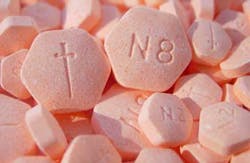The U.S. Food and Drug Administration (FDA) has given the green light to two generic versions of Suboxone, a drug used for treating heroin addiction, manufactured by Reckitt Benckiser. With its move, the drug regulator turned down Reckitt's bid for stricter packaging regulation, which would have seen the firm remain the only maker of the drug.
Suboxone accounts for a substantial part of the UK-based company's pharmaceutical arm and having its patents confirmed was of great significance to the manufacturer. The FDA's decision is expected to put the company in a highly competitive environment and at risk of losing profit. Reckitt commented that the regulator's ruling was "disappointing" and claimed that the generic versions would reduce tablet sales by up to 90 percent and sales of the newer film-strip version which is designed to dissolve under the tongue by 20 percent. The latter currently holds a market share of about 64 percent in the United States.
However, the arrival of competitors was not unexpected for the company. Experts have been warning of potential rivals since its exclusive rights over the drug expired in 2009. Last year Reckitt withdrew its Suboxone tablets in the United States and replaced them with the sealed film version because tablets were more likely to be mistakenly taken by children. As competitors moved to enter the market, Reckitt tried to stop the generic variants by calling for the FDA to impose regulations for more stringent packaging that would protect children.
RELATED: New drugs launched in UK on the rise
However, the FDA decided that existing programs for educating manufacturers about packaging were adequate and approved the two generic versions of Suboxone to be distributed in the United States, Reckitt announced. According to analysts, it is likely that the generic variants will grab a share in the tablet segment and serve as a substitution for film. Estimates from Deutsche Bank, quoted by Reuters, predict that Reckitt's profits will drop two percent in 2013 if generics are launched within a month following their approval and if 90 percent of tab users switch within nine months.
The regulator stated that although it encourages companies to adopt the practice of producing drugs in unit-dose packing for buprenorphine products, it did not find sufficient evidence that the lack of such packing should be an obstacle for manufacturing and distributing the products. Furthermore, the FDA said that it had received evidence that Reckitt's petition was an anti-competitive practice and announced it would refer the company to the Federal Trade Commission.
Recently, the number of accidents involving children being exposed to the drug has declined, due to a combination of factors like clearer labeling and better awareness among pharmacists and patients of the risks associated with overdosing, the FDA noted.
Despite the approval of the generic variants of the drug, Reckitt said it remained confident that Suboxone provided value and benefit to patients and that it represented a notable advancement in product technology.
